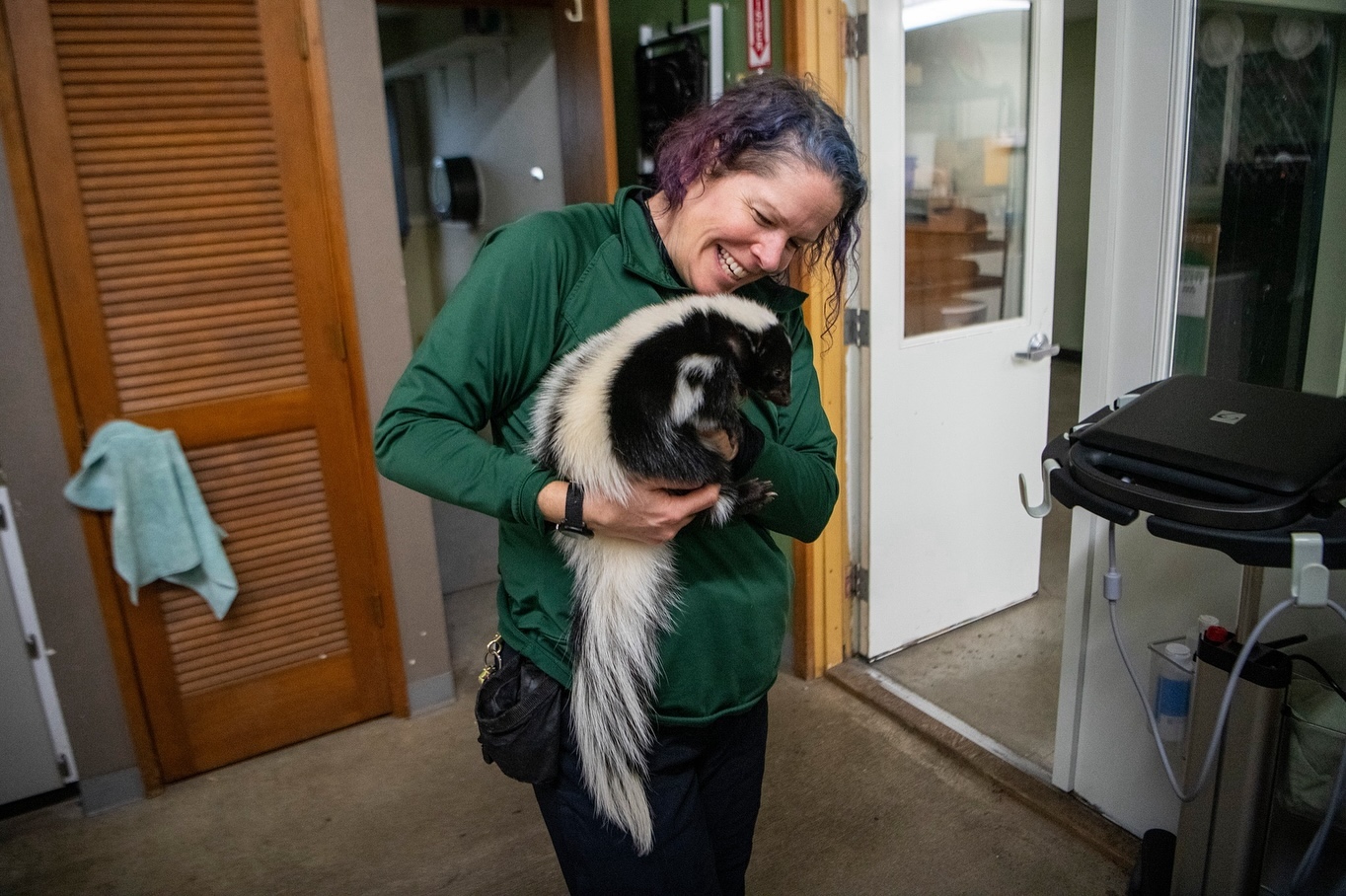- Marigold’s successful wellness exam and its significance in skunk health care.
- The procedures conducted during the exam: x-rays, ultrasound, dental care, and more.
- An overview of skunk care within zoo environments, highlighting their needs and welfare.
- Conservation and education efforts in zoo management regarding skunk species.
- Reuniting Marigold and Dewey: understanding skunk behavior and socialization.
Marigold, an 8-month-old skunk residing at our facility, recently underwent a comprehensive wellness check, a critical aspect of maintaining health in captive wildlife. Routine examinations are fundamental in zoo management, facilitating early detection of potential health issues and ensuring that animals like Marigold are thriving. This latest examination serves as an excellent case study in the proper care and attention required by skunks within zoo environments.
Key to Marigold’s health assessment was the use of anesthesia, an indispensable tool in veterinary procedures for minimizing stress and allowing thorough examinations. During the exam, Marigold received a series of diagnostic tests, including x-rays and an ultrasound. These tools are crucial in assessing her internal health, providing insights into her skeletal structure and organ condition. Her imaging tests revealed no abnormalities, an indicator of her strong overall health and well-being at this stage of her life.
Dental care is another critical component of skunk health. Skunks, like many mammals, can suffer from dental issues that may not be immediately visible but can lead to significant health problems if left untreated. A detailed dental examination under anesthesia allowed the veterinary team to assess Marigold’s oral health, ensuring she had no signs of decay or infection. Proper dental health is integral to her ability to feed effectively and maintain good nutrition.
Moreover, nail trimming was part of Marigold’s wellness exam. This seemingly simple procedure has substantial importance, as overgrown nails can lead to discomfort and complications in skunks’ movement and daily activities. Regular maintenance helps prevent these issues, promoting comfort and mobility.
Marigold also received a birth control implant, a decision weighed carefully by the zoo’s conservation and animal management team. Managing animal population within controlled environments is essential to prevent overcrowding and maintain biodiversity. This implant is a humane and effective method of population control and is commonly used in zoos to help balance species populations and ensure all animals can receive adequate resources and attention.
Weighing in at a robust 5 pounds, Marigold has proven her health and suitability to rejoin her companion Dewey, a two-year-old striped skunk. Social interactions play a pivotal role in the psychological and emotional health of skunks and other wildlife in managed care. Reuniting these two skunks is expected to be beneficial for both, fostering companionship and enriching their lives within the habitat they share.
Zoo environments strive to mimic the natural habitats of their residents while ensuring safety and enrichment. Skunks require specific habitats that allow for their instinctual behaviors, such as foraging and exploring. Proper management of these facilities, including climate control and enrichment activities, crucially supports these animals’ well-being.
Furthermore, skunk care in zoos is heavily linked to conservation and education efforts. Skunks play an important role in the ecosystem, and by facilitating audiences’ understanding and appreciation of such animals, zoos contribute to broader conservation goals. These institutions serve as a bridge between the public and wildlife, fostering knowledge and attitudes that support ecological preservation.
Understanding skunk behavior and socialization is essential when managing such species within a zoo. Skunks are naturally solitary but social animals, thus creating opportunities for socialization in a controlled environment enhances their quality of life. Observing Marigold and Dewey’s interactions can provide valuable insights into their behaviors, potentially informing future strategies for care and management in other zoo settings.
In summary, Marigold’s recent wellness exam epitomizes the multifaceted approach to zoo animal care, highlighting the dedication and professionalism involved in keeping skunks healthy and content. Such diligent care ensures these animals not only survive but flourish in their environments, fulfilling the educational and conservation objectives cherished by modern zoos.
*****
Source Description
Marigold, our 8-month-old skunk, recently had a routine wellness exam and passed with flying colors! While under anesthesia, she received x-rays, an ultrasound, a dental check and nail trim, and a birth control implant. Weighing in at a healthy 5 pounds, Marigold is thriving. She’s now ready to rejoin Dewey, our two-year-old striped skunk, in their shared habitat. The duo will be reunited later this week, and we can’t wait to see them together again!


